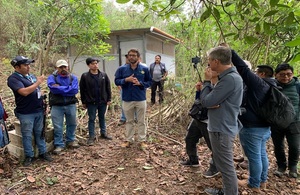Communities in Quetzaltenango, Sololá and Chimaltenango will increase their living standards
The British Ambassador visited a project in Sololá that is allowing indigenous communities in the Zunil-Atitlán-Balam Juyu' corridor to improve their economy through the conservation and sustainable use of biodiversity.

The project “Improving integrated landscape management on the Zunil-Atitlán-Balam Juyu biocultural corridor” will support the economy and sustainable livelihoods of 300 families, 50 coffee farmers and 40 beekeepers located in the corridor that extends from the Zunil Volcano in Quetzaltenango, through the western volcanic chain south of Lake Atitlán in Sololá, to the Balam Juyu’ hill in Chimaltenango.
The activities are funded through the Darwin Initiative from the Department of Environment, Food and Rural Affairs (Defra) of the British Government and executed by The Nature Conservancy (TNC) and Asociación Vivamos Mejor. The investment amounts to more than Q4.5 million and will be implemented between June 2023 and March 2026.
During the first year of execution, the project has focused on two areas: improving the capacities of local actors for inclusive governance and sustainable management of the corridor, and the restoration of biological connectivity through reforestation.
The forests of the corridor are of great importance due to their great biodiversity and the ecosystem services they provide; the corridor is also the ancestral home of several Mayan peoples (Tz’utujil, Kaqchikel and K’iche’) who base their livelihoods on the goods and services provided by the forest. However, the area is affected by poverty and suffers from deforestation at an alarming rate. To respond to these problems, the project focuses on improving the conservation and sustainable use of biodiversity.
With the leading role of the National Council of Protected Areas (CONAP), the project is helping on the constitution of a Support Table for the Joint Administration of the Conservation Areas of the Central Highlands, which includes the participation of the managers of protected areas of Sololá and Chimaltenango. In addition, an analysis of forest fire occurrences was carried out, which will serve as a basis for planning a Regional Strategy for Integrated Fire Management, an activity that will be a priority in this second year of execution.
35,000 plants of 38 forest species were produced, of which 49% correspond to endemic and threatened species, for the reforestation of 30 hectares in key sites. Additionally, to improve the family economy in the corridor, 225 wood-saving stoves were built, prioritizing communities located in important areas for ecological connectivity in the corridor.
With an integrated landscape management approach, the project will strengthen the management capacities of state institutions, local governments, and indigenous communities; will generate knowledge about local biodiversity; will improve inter-institutional coordination and strengthen indigenous cooperatives that provide better livelihoods to reduce rural poverty.
Nick Whittingham, British Ambassador to Guatemala, said:
It is very important for the United Kingdom to confront the triple crisis of biodiversity loss, extreme poverty and climate change. This project demonstrates that through a collaborative and landscape-level approach, valuable objectives can be achieved.
Juan Carlos Godoy, Director of TNC Guatemala, emphasized:
This project constitutes an important advance for the conservation and sustainable use of the Mesoamerican Forest and contributes to the consolidation of a systemic change in which people recognize the importance of conservation to receive the common benefits that nature provides and that improve the quality of life of the communities.
Eduardo Secaira, Director of the Asociacion Vivamos Mejor, stated:
Together with TNC and the Darwin Initiative, we hope to motivate the participation and action of local actors in the conservation of the corridor and its surroundings, to join forces to improve the quality of life and the extraordinary natural environment that surrounds us.